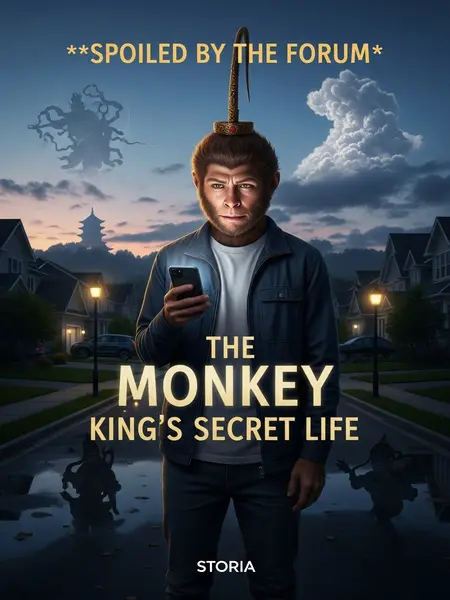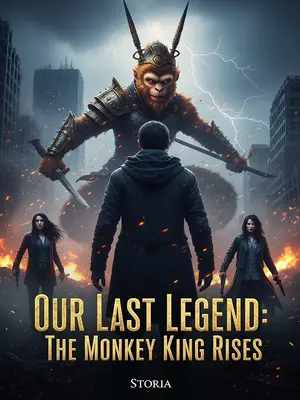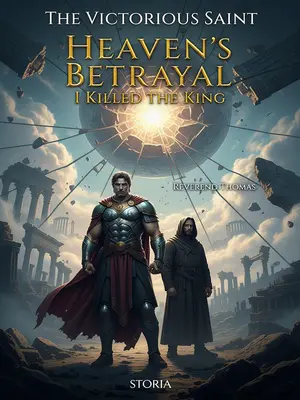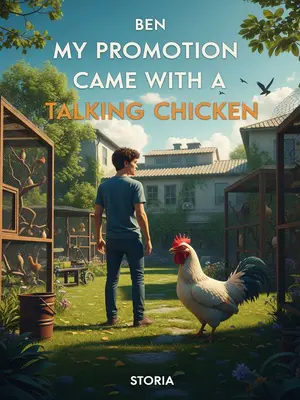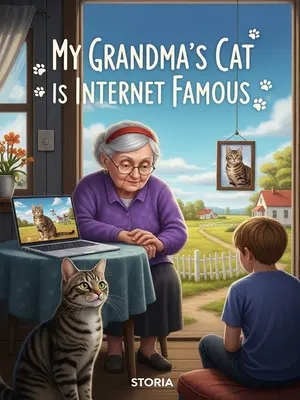Chapter 2: Secrets of the Forum
After today’s lesson, Marcus joined his fellow students in thanking the professor, then returned to his own room in the back of the community center.
The building always smelled faintly of floor wax and last week’s bake sale. Marcus shuffled past the vending machines and faded motivational posters, waving at Mrs. Ramirez, who was setting up for bingo night. He made his way to the staff wing, where a room with a creaky radiator and a view of the Ridge served as his retreat. He closed the door, switched off his phone, and settled in on his battered cushion, legs folded in the familiar cross-legged posture he’d perfected over a hundred quiet afternoons.
He found his usual meditation cushion, sat cross-legged, and closed his eyes to focus.
Outside, the distant buzz of a lawn mower blended with the soft clink of ice in a neighbor’s glass. Inside his mind, though, Marcus drifted into a space that felt bigger than the room, bigger even than Maple Heights. It was like logging on to a secret network only he could access.
A strange and fascinating place appeared in his mind.
Neon colors flashed, little digital avatars bounced across the screen, and every post had its own set of emojis. It felt like stepping into a weird mix of Reddit, Discord, and an old-school BBS—except the discussions ran deeper and wilder than any chatroom Marcus had ever found on his phone.
According to its inhabitants, this was called a "forum"—divided into many sections, where people with similar interests formed their own circles to discuss whatever they liked.
Some called themselves story scholars, others were self-appointed fan-theorists, and a few just hung out for the memes. Everyone had an opinion, and most weren’t shy about sharing it. Marcus marveled at the way conversations spiraled out, linking everything from ancient legends to the latest Marvel movie drop. He even found himself in the middle of a heated meme war, with users arguing over the best Journey to the West adaptation and tossing in pop culture references: 'Monkey King vs. Thanos—who wins?' The energy was pure American internet: loud, opinionated, and a little bit wild.
Marcus had stumbled into a section called the Journey to the West Forum.
It was tucked away behind a few cryptic hyperlinks, sandwiched between 'Ultimate Pizza Rankings' and 'Conspiracy Theater.' The regulars there were like cult movie buffs crossed with literature professors—equal parts brilliant and bonkers. Every post read like an urban legend or a secret code, and Marcus felt like he’d found his people.
At first, he paid it little mind. But after years of quietly lurking, and then actively engaging with the forum users (known as regulars—enthusiastic, often chatty posters), Marcus discovered an astonishing secret:
He started off just reading, occasionally upvoting a particularly clever post, but after a while he started asking questions of his own. The regulars responded with GIFs, memes, and long, passionate rants. Over time, Marcus realized that these anonymous strangers knew more about his world than he did—and they didn’t mind sharing, as long as you could handle a little snark in return.
He was actually the protagonist of the Journey to the West world.
His hands went cold. Was this a prank? Or was he really supposed to be the hero? That sounded like way too much responsibility. The realization left him reeling—a mix of panic and wild excitement churning in his chest.
Within a few years, Marcus had memorized every major plotline of Journey to the West—and even its sequels—by heart.
It was almost embarrassing, how fast he turned into a superfan. He could recite obscure chapter titles, predict every character arc, and quote the dialogue from even the most random side stories. His friends would groan, 'Don’t start, Marcus,' whenever he launched into a theory about which monster actually had the best redemption arc.
He devoured posts like "The Journey to the West You Never Knew," "Hidden Storylines in Journey to the West," and "The Top Ten Opportunities in Journey to the West," until he was thoroughly familiar with them all.
There were listicles and Easter egg hunts, arguments about which episode had the best special effects, and entire threads debating whether the Monkey King should have gone pro in baseball instead of fighting demons. Marcus didn’t just read—he annotated, screenshot, and even doodled little diagrams in his notebook.
Whenever Marcus posted questions, the forum regulars answered in detail, their tone so bold that they seemed to treat the President and the Pope like nobodies—full of that distinctive internet bravado. Marcus snorted at the screen, nearly choking on his Mountain Dew. Typical internet—always so sure of themselves.
One guy, 'BigRedDog420,' would break down supernatural politics as if he’d been in the room with the gods. Another, 'PandaGirl12,' wrote long, all-caps rants about how all the legendary relics were secretly just plot coupons. The community had that uniquely American mix of sarcasm and sincerity—a place where you could roast the President in one sentence and solve a centuries-old riddle in the next.
Gradually, Marcus came to understand the opportunity he now had at Maple Heights Ridge.
He realized he was standing at the heart of something huge—a once-in-a-lifetime crossroads where knowing a few spoilers could change everything. Marcus felt a surge of gratitude for every late-night scroll, every off-topic meme, every heated debate in the forum that ended in a virtual high-five.
His mentor, Professor Bodhi, was undoubtedly one of the most powerful figures in the entire Journey to the West universe.
Even when Bodhi was running the pancake breakfast fundraiser or coaching the JV debate team, there was something in his eyes—like he was always three moves ahead. Marcus saw through the surface. He knew that behind those dad jokes and Socratic questions lay a mind sharper than any ancient sword—a teacher who could shape destinies as easily as running a bake sale.
But his time at Maple Heights Ridge was limited. Sooner or later, Bodhi would send him away, forbidding him to reveal the source of his skills.
Marcus sometimes caught Bodhi watching him with a knowing smile, as if he could see right through every secret. He remembered a line from the forum: 'The teacher always knows more than he lets on.' It was only a matter of time before the next chapter began, and Marcus would have to step out into the world with his arsenal of tricks—and a promise to keep his sources under wraps.
With all the forum knowledge, Marcus realized that Bodhi was, to some extent, deceiving him. Just the Supreme Immortal Method alone—how could the great sages not recognize it as the President’s own technique?
He couldn’t help but grin at the thought: if the greatest leaders on Earth were learning from the same playbook, what made his journey so different? It was like finding out your high school gym routine was actually designed by the Navy SEALs. The whole world ran on borrowed wisdom, and Marcus was determined to make it his own.
But the forum users were right: in the original Journey to the West, old Marcus was basically a tank—max defense, but weak offense.
It stung a little, reading the old posts: 'Monkey King? More like Monkey Shield.' The memes were brutal but honest. Marcus realized that for all his invincibility, he’d still gotten his tail handed to him by a bunch of mid-tier villains. That was a wake-up call.
Before causing havoc in Heaven, he was the Great Sage Equal to Heaven. But once the journey began, any random monster with a magic artifact could pummel him into a sorry state.
In internet terms: 'OP until the patch notes drop.' The moment the big quest started, his plot armor got downgraded, and the enemies suddenly got a lot smarter. Marcus saw the pattern and vowed not to fall into the same trap.
If only his offensive power were higher, he could have finished off those monsters in a single blow—who would care about their backgrounds then?
'Power creep,' they called it on the forum. Marcus made a mental note: next time, don’t just play defense. Get the big moves, the game-changers. That way, he’d be the one writing the rules.
So the key to everything was right here on Maple Heights Ridge.
Marcus realized the Ridge wasn’t just a sleepy suburb—it was the launchpad. The way to get ahead wasn’t in running away or breaking the rules; it was in quietly, doggedly, mastering every lesson, every skill, every hidden technique.
If he could learn even one more powerful attack technique, he’d be far less embarrassed in the future.
He started keeping a secret wish list—'Skills To Learn Before Graduation.' Number one: a real, honest-to-goodness power move. Number two: a get-out-of-jail-free card. Number three: a killer exit line for dramatic moments.
It all depended on how much Bodhi would let him learn.
Sometimes, Marcus wondered if Bodhi suspected how much he already knew. There was a cat-and-mouse element to their lessons now—a subtle dance between teacher and student, both aware the stakes were higher than ever.
According to the forum users, Bodhi’s reason for expelling him was just an excuse: after Marcus showed off the Seventy-Two Transformations to his fellow students, Bodhi sent him away. If Bodhi taught him even more powerful magic, Marcus’s combat ability might surpass what the gods and great leaders could tolerate.
'It’s not about what you know,' one forum regular posted, 'it’s about how much the powers-that-be are willing to tolerate before you rock the boat.' Marcus took it to heart—no showing off, no big scenes, no reason for Bodhi to get spooked.
Therefore, Marcus now kept an extremely low profile, giving Bodhi no excuse to send him down the mountain.
He blended in with the crowd, never raising his voice, always volunteering for cleanup duty. The teachers called him 'reliable.' His classmates said he was 'chill.' Marcus knew it was all part of the plan.
At first, Marcus had scoffed at the basic skills Bodhi taught the students—thinking they were just trivial, not worth his time.
He’d rolled his eyes at first, thinking, 'What good is learning how to balance a checkbook or meditate for ten minutes?' But now, he saw it all differently.
But after being educated by the forum users, his thinking changed.
He started taking notes in the margins, doodling flowcharts, and seeing the hidden logic in every lesson. The forum had turned him into a connoisseur of even the most basic skills.
Even minor skills are part of the path; they each have their use. Existence is reason enough.
He remembered an old coach saying, 'There’s no such thing as wasted practice.' Marcus made it his new mantra. Every trick, every drill, every weird after-school assignment had its place. In the end, it all added up.
On Maple Heights Ridge, Bodhi mainly taught four categories: [Art], [Flow], [Movement], and [Stillness].
The official curriculum sounded fancy, but really, it broke down like this: art was understanding how the world worked; flow was about navigating people and ideas; movement was learning how to act decisively; and stillness was learning how to wait, how to think, how to find peace when the world went nuts.
- Art: Understanding the forces of nature, connecting earth and sky, predicting fortunes and avoiding disaster.
Marcus learned to read the weather just by looking at the clouds—handy for planning a Friday night bonfire or calling off baseball practice before a storm. He got so good at it, even the local weatherman started texting him for tips.
- Flow: Mastering all disciplines, seeking the truth and the heart, approaching wisdom, and learning from mentors.
He started helping out at the community garden, picking up carpentry from Mr. Jenkins, and joining the chess club. Marcus found wisdom in places he’d never looked before—at the barbershop, at Sunday service, even in old sitcom reruns on late-night TV.
- Stillness: Cultivating the self, meditating, entering deep focus, shutting out distractions.
Every morning, Marcus would find ten quiet minutes to sit by his window, eyes closed, letting the world settle. It became his daily ritual, like a mental reset button—one that got him through everything from pop quizzes to heartbreak.
- Movement: Gathering and supplementing, archery and marksmanship, refining potions and taking medicine.
He joined the track team for a season, learned archery at summer camp, and even tried his hand at brewing weird herbal teas his grandma swore by. At first, it all seemed random, but over time, he saw the method in the madness.
At first, Marcus dismissed these as useless. But after forum enlightenment, he realized what he’d been missing.
He realized the world wasn’t built on flashy moves and headline moments, but on steady work, quiet practice, and a willingness to learn from everyone around him. The forum had taught him that—over and over, in a thousand snarky comments.
Art, for example, is the foundation of all those finger-calculating divinations the great figures in Journey to the West perform.
It wasn’t just hocus-pocus; it was a way of reading between the lines, understanding how everything connected. Marcus used it to make sense of class politics, small-town rumors, and even the odds at the Friday night poker game.
Flow is about understanding the wisdom of the everyday world, drawing analogies, and grasping the big picture through simple things—seeing the truth in details, and learning from mentors.
He started to see the patterns—how people moved, how they talked, how they tried (and sometimes failed) to hide what they really wanted. Marcus became the go-to guy for advice, the quiet fixer behind every group project.
As for movement and stillness, they’re even more crucial: stillness is introspection, movement is outward breakthrough.
It was the balance that mattered. Stillness was learning to breathe through the hard times; movement was knowing when to speak up, when to take that leap, when to fight for what mattered.
"Archery and marksmanship" isn’t just literal; it’s the method of mastering weapons. Think about it—wielding the Magic Staff without any proper technique, just flailing it around? That’s hardly optimal.
He realized there was a right way and a wrong way to do everything, from swinging a baseball bat to standing up for a friend. Technique mattered. Precision mattered. You didn’t just charge in; you learned the craft.
And as for potion-making and medicine—when Marcus downed the elixirs in the old professor’s lab, forum users joked they were all "placebos." The legendary apples in the secret garden? He ate them all, but without any refining method, he might as well have been eating regular fruit.
He laughed about it now: all those protein shakes, all those green smoothies—without understanding what his body needed, it was just calories. Marcus started reading labels, talking to the school nurse, asking his grandma about home remedies. Knowledge mattered as much as effort.
The more he learned, the more insignificant he felt.
For every trick he mastered, ten more popped up he’d never even heard of. The more he learned, the more he realized he was just scratching the surface.
Marcus was no longer the arrogant monkey who looked down on everything. He became cautious and careful, strengthening himself at every turn, and reevaluating the world around him.
He started listening more and talking less. He watched for the details, the things everyone else missed. His confidence was quieter now, but much, much deeper.
He shifted from seeking immortality to seeking the truth. This change in mindset was pivotal.
It was no longer about being the toughest or the loudest. Now, Marcus wanted to understand—himself, his world, the reasons behind everything. It gave his journey a new shape, a new urgency.
When Marcus finished his studies and left the mountain, who knew what kind of shock he would bring to the world?
The possibilities stretched out before him, as vast and wild as the open road beyond Maple Heights. Marcus knew the next chapter was coming—and he was ready to write it on his own terms.
